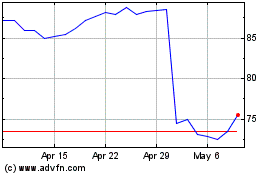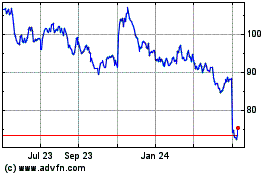Starbucks Cuts Sales Forecast -- WSJ
July 22 2016 - 3:03AM
Dow Jones News
By Maria Armental
Starbucks Corp. on Thursday blamed political and social unrest
at home and abroad for disappointing results in Europe and the U.S.
that resulted in its third consecutive sales-target miss.
Company executives called the quarter an "anomaly," citing
terror concerns around the world along with civil unrest and
political uncertainty in the U.S. and a "profound weakening in
consumer confidence."
"In Starbucks's 24 years of public life, I can't recall a
quarter quite like" this, Chief Executive Howard Schultz said
during a conference call to discuss third-quarter results.
The company's shares, which have fallen 4% this year, slipped 3%
to $56.07 in after-hours trading Thursday, after ending 4 p.m.
trading fractionally higher at $57.60.
The Seattle-based coffeehouse chain, which previously projected
annual sales to increase 10% or more, now expects just about 10%,
with sales at stores open at least 13 months increasing by a
mid-single-digit percentage, a slight downward revision.
Meanwhile, the company raised its profit forecast by 3 cents,
saying it now expects to make $1.88 to $1.89 a share. A wage
increase scheduled to go into effect in October, Chief Executive
Officer Scott Maw said during the conference call, has been
factored into its guidance and won't affect the profit outlook.
"There's no wavering in our commitment to deliver at least 15%
EPS growth every year," Mr. Maw said, adding, "that is true for
2017."
Domestic sales, which account for the bulk of business, rose 8%
while comparable sales rose 4% in the most recent quarter. In the
year-ago period, the company reported 13% and 8% increases,
respectively.
During the conference call with analysts, company executives
sought to ease concerns over a possible slowdown in the U.S. and
disruption brought on by changes in the company's loyalty program,
pledging to return the U.S. business to historic levels of at least
5% comparable-sales increases.
Though company officials had warned some customers may push back
against the loyalty program changes, which now link rewards to
spending rather than number of visits, on Thursday they said in the
latest period the program expanded to 12.3 million active members
in the U.S., an 18% increase from the year earlier.
Comparable sales in Europe, Middle East and Africa fell 1%,
against analysts' projected 2.8% increase, while overall sales in
the region fell 7%, in part tied to volatility in the U.K., its
largest market in Europe, and the sale of its stores in Germany,
which had been its largest market in continental Europe.
Meanwhile, China and the Asia Pacific region saw a
weaker-than-projected 3% increase.
China, a key pillar in its international expansion and which
company officials project will overtake the U.S. as its largest
single market, saw a 7% increase in comparable sales.
Starbucks, which now has nearly 2,300 stores in China, targets
more than 3,400 stores by 2019.
Over all, Starbucks reported profit of $754 million, or 51 cents
a share, compared with $626.7 million, or 41 cents a share, a year
earlier. Excluding certain items, profit was 49 cents, compared
with 42 cents a year earlier and at the high-end of the company's
guidance. Revenue rose 7% to $5.24 billion.
Julie Jargon contributed to this article.
Write to Maria Armental at maria.armental@wsj.com
(END) Dow Jones Newswires
July 22, 2016 02:48 ET (06:48 GMT)
Copyright (c) 2016 Dow Jones & Company, Inc.
Starbucks (NASDAQ:SBUX)
Historical Stock Chart
From Mar 2024 to Apr 2024

Starbucks (NASDAQ:SBUX)
Historical Stock Chart
From Apr 2023 to Apr 2024
